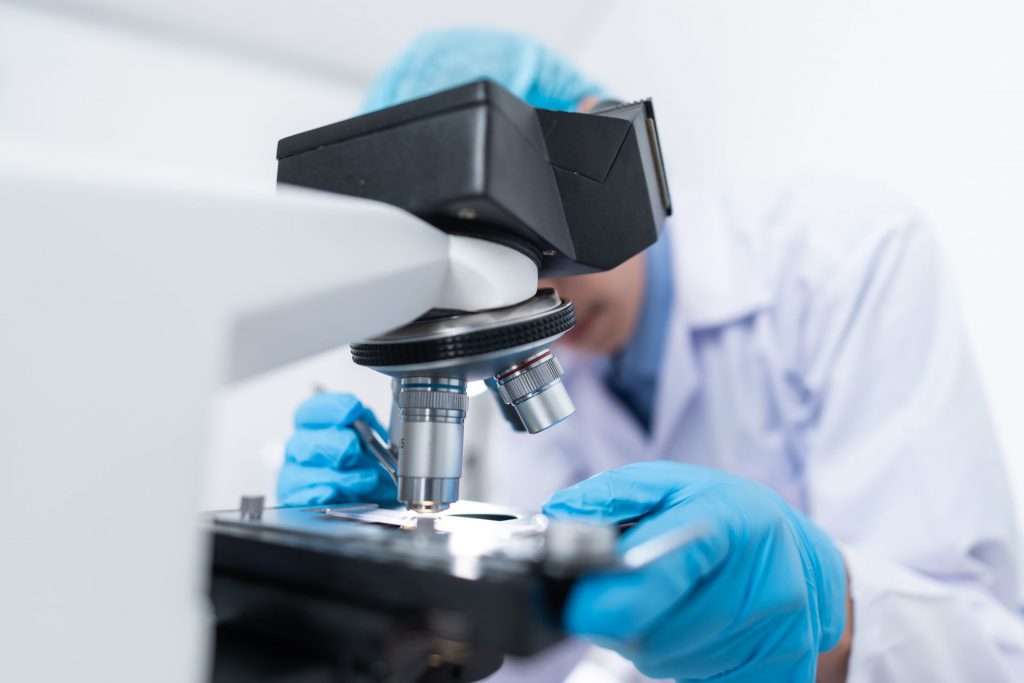Groundbreaking Results Cement North Netherlands' Role in Diagnostic Innovation within the Open Diagnostics Ecosystem
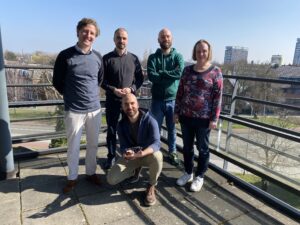
The goal behind the establishment of the Open Diagnostics Ecosystem (ODE) was crystal clear in the spring of 2020: to bolster and market the position of North Netherlands as a global player in the field of (medical) diagnostics. As the project draws to a close in December 2023, the initiators reflect upon an exceedingly successful journey. Ton Vries, Chairman of the LIFE Cooperative and initiator of ODE, states, “In a relatively short period, we’ve successfully shepherded nine projects from eight different companies within ODE. The results of these companies speak volumes: the network infrastructure and substantive financial support have led to tremendous achievements in diagnostics. We take exceptional pride in this.”
International Alliances
The Northern region has proven itself within the project as an exceptionally suitable hub for developing innovative diagnostic products. One of ODE’s aims was to entice a leading diagnostic player like Roche to establish itself in the region. While this hasn’t occurred yet, alliances were forged at various international leading expos such as BIO in Boston and Leipzig, attracting a significant number of startups from the UK to Groningen to foster collaboration and learning.
From Bacterial Imaging to AI
The eight startups that successfully underwent a learning journey within ODE include Reyedar, Protyon, Neolook Solutions, Sabiad, SG Papertronics, Detact Diagnostics, Tagworks Pharmaceuticals, and CC Diagnostics. From bacterial imaging enabling early infection detection at Sabiad to utilizing AI to detect anomalies in premature babies by Neolook, these companies have leveraged the Open Diagnostics ecosystem to boost their innovations. The startups recognize the potency of the ODE network, its accessible approach, and funding as pivotal ingredients for their success. View all projects in the Open Diagnostics Video here.
ODE’s Future Endeavors
The learning projects conclude their journeys at ODE in December, marking the successful closure of this initiative. Peter Ketelaar, Director of ODE, emphasizes that the experiences from ODE hint at more opportunities: “From the outset, it was clear this was a journey with a defined beginning and end. However, the positive experiences of participating companies and the successful innovations hint at more. We’re proud of the international impact achieved. Therefore, we’re currently exploring the prospects of a follow-up to this ecosystem. There’s interest from the industry, and we’re seriously considering options for a sequel to ODE, in the form of a Life Sciences & Health Portal, not limited to diagnostics but for the entire sector.”
Protyon’s Case: Navigating for Physicians
Protyon, a medtech startup from Groningen, aims to enhance the quality and prolong the lives of people with cancer, specifically lung cancer. Within ODE, they’ve developed a prototype of their innovative software technology, Voythea. This technology provides physicians an automated tool for personalized treatment options based on molecular modeling of unknown cancer mutations. The objective is to enhance treatment effectiveness through better analysis of mutations in cancer proteins. Protyon’s software generates 3D models of mutated proteins, enabling more precise treatment proposals. Named to capture the essence of the company – a blend of ‘Procyon’ and ‘protein’ – Protyon serves as a ‘navigator’ for physicians, based on the pioneering work of UMCG’s Molecular Tumor Board. Their efforts showcase promising results, significantly extending lifespans and improving the quality of life for patients, garnering national and international interest in their technology.
Reyedar’s Case: From Cable Bundle to Complete Device
Reyedar focuses on developing preventive diagnostic tools for visual and neurodegenerative conditions. Within ODE, Reyedar furthered its diagnostic tool, contributing, among other things, to early detection of changes in eye movements. By combining swift oculography with artificial intelligence, Reyedar offers medical insights into the nervous system and visual functions. This non-invasive, painless method rapidly gathers extensive information, alleviating pressure on physicians and catering to diverse age groups. They aim to promote telemedicine by developing a system to remotely collect and analyze eye data, enhancing healthcare accessibility. Participation in ODE has propelled Reyedar significantly, as stated by Alessandro Grillini, CEO of Reyedar: “We began the ODE project with a prototype essentially being a bundle of cables holding various components together, and we ended the project with a complete device that has made headlines multiple times in the Dutch optics market.”
Watch the fresh released ODE movie now: https://youtu.be/hziSbmfEHU4
Open Diagnostics project highlight: Protyon

The third cooperation of ODE in our retrospective is Protyon. Josef Melcr, CPTO of Protyon: The ODE ecosystem provided Protyon with a welcome support in our first steps towards our vision to include a molecular visualization of the disease in all patient treatment conversations. The subsidy helped us in developing our software service for clinical oncologists. Now, we will be able to perform our modeling analysis advising on treatment recommendation for lung cancer patients with novel tumor mutations in a matter of hours instead of days.
Open Diagnostics project highlight: Sabiad
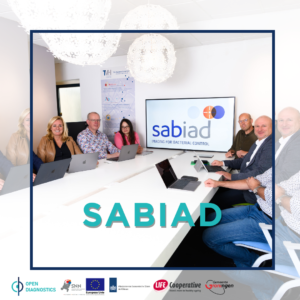
The second successful match of ODE in our retrospective is Sabiad. 🦠 ODE x Sabiad: Shaping the Future of Bacterial Imaging Diagnostics!
At the Open Diagnostic Ecosystem (ODE), we’re happy to partner with Sabiad in their quest to revolutionize bacterial infection imaging.
Saskia van den Dool, COO at Sabiad, emphasizes the importance of funding for their pioneering work: “For Sabiad, an early-stage startup in bacterial imaging innovation, securing funding is paramount. Our innovation has the potential to redefine healthcare, and we’re grateful for ODE’s support.”
But our vision extends beyond the present. With ODE’s backing, we aim to connect Sabiad with the exceptional research and development facilities in the Northern Netherlands, nurturing local production and fostering regional innovation. Together, we’re committed to transforming the Northern Netherlands into a global hub for advancements in bacterial imaging diagnostics.
Discover more about Sabiad at sabiad.eu
Open Diagnostics project highlight: Reyedar

What a ride! As we step into the last chapter for the Open Diagnostics Ecosystem at the end of this year, let’s take a moment to reflect on the incredible projects that joined the ecosystem. In the upcoming weeks we will highlight all the remarkable projects that defined our year.
Starting with Reyedar, a dynamic spin-off from the Ophthalmology Department at the University Medical Center Groningen, Netherlands. Launched in early 2020, Reyedar is on a mission to revolutionize healthcare! They’re rapidly growing, and their goal is simple – to make healthcare more accessible and affordable for everyone. How? By developing cutting-edge, non-invasive, portable diagnostic tests using the power of eye movements!
How does Allesandro Grilini, CEO of Reyedar, look back on thier participation in our ecosystem? Grillini: ”A ‘magical’ moment during the project has been the time when the whole team got together to assemble the first specimen of the device. We started the ODE project with a prototype that was essentially a bunch of cables keeping together several components, and we ended the project with a complete device that already made the news several times in the Netherlands’ optician market.”
Computable Award for Neolook and UMCG

The Groningen-based and ODE member Neolook, in collaboration with the UMCG, has won the Computable Award 2023 in the ‘Healthcare’ category for their project ‘Early Moves.’ The Computable Awards, known as the Dutch IT Oscars, were announced on Monday, October 30. The ‘Early Moves’ project aims to provide the best possible care for prematurely born babies using artificial intelligence (AI). Marco D’Agata, CEO of Neolook, is extremely pleased with this award: ‘We are very proud that, together with the UMCG, we have received this Award for our ‘Early Moves’ project, chosen from 49 entries in this category. What makes it even more honorable for us is that we were selected as winners by both the jury and the public, with a significant lead. In total, there were 1,577 votes in the healthcare category, with Neolook and UMCG receiving 26.88% of the jury votes and 20.74% of the public votes.
Early detection
The project evolves around early detection in prematurely born babies. Prematurely born babies often face an elevated risk of various growth, movement, and development issues. Early detection of potential abnormalities is crucial to minimize long-term effects. In this project, artificial intelligence (AI) is employed to detect deviations through motion analysis based on video footage.
NeoLifeS
Each year, UMCG admits 80 to 120 prematurely born babies. For these infants, periodic check-ups are essential. UMCG aims to identify potential developmental issues at an early stage, which led to the creation of a central database encompassing all hospitals called NeoLifeS. This database aims to map problems and risk factors and enhance the care provided to prematurely born babies, allowing for their comprehensive monitoring throughout childhood.
Thanks to this project, it is possible to determine within three months whether a baby is developing normally or if there are potential abnormalities. Video footage is collected and analyzed at UMCG, utilizing AI and recording equipment developed by Neolook. Researchers can determine whether there are normal or abnormal movement patterns and whether further investigation is required with just a few minutes of video.
About the Computable Awards
Computable is a prominent Dutch platform for ICT professionals, providing daily ICT news, analyses, and columns. The platform was founded in 1968. The Computable Awards will be presented on October 30th this year, with seventeen awards to be given during the 18th edition of the Computable Awards. Readers of Computable had the opportunity to nominate candidates for an award via the website.
Source article: Campus Groningen.
Header photo: winners Computable Awards 2023 on October 30. Photo: Computable Awards.
Innovation in early detection of orthopedic infection from Sabiad joins the Open Diagnostics Ecosystem
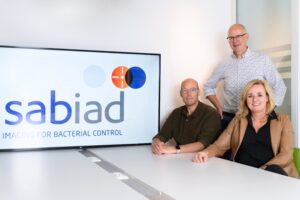
The Open Diagnostics Ecosystem (ODE) is proud to introduce the newest project in the ecosystem, which will come from Sabiad. The goal of Sabiad, a spin-out of the UMCG, is bacterial imaging to enable early detection of infection to allow fast and appropriate treatment. Sabiad develops a monoclonal antibody, which visualises staphylococcal aureus related infections in the orthopedic implant area not only accurate, but also fast and minimally invasive. With the support of ODE, Sabiad will further develop their platform.
Daan van Oldeniel, Business developer at Open Diagnostics is excited about the new learning project: “We are thrilled to welcome Sabiad into the Open Diagnostics ecosystem. Their expertise and innovative contributions will undoubtedly enrich our collaborative efforts, propelling us even closer to our shared goal of advancing diagnostics for the betterment of healthcare worldwide.”
A rapid and precise diagnosis
Staphylococcus Aureus (SA) is the biggest malefactor when it comes to implant-associated infections, particularly in cases involving hip or knee replacements. One in 3 people carry the bacteria without symptoms, but if the bacteria enters the bloodstream during a surgical procedure, such as placing an implant, it can be dangerous. As a result, the primary application of this cutting-edge technology lies in providing a rapid and precise diagnosis. A rapid diagnosis is needed when there is an SA-related infection suspected, especially after prosthetic replacement. ‘’The main innovation of Sabiad’s solution is the use, for the very first time, of a monoclonal antibody for infection imaging. A few years ago, an antibody called 1D9 was developed in my group to detect staph aureus, which allows the bacteria to be identified.‘’ tells Jan Maarten van Dijl, one of the founders of Sabiad and professor medical microbiology and infection prevention of the UMCG.
Collaboration with the UMCG
Extensive market research and insights gathered from leading orthopedic surgeons have confirmed the immense potential of the technology from Sabiad, in the field of hip and knee revision surgery. This project is geared towards advancing the clinical, technical, and economic feasibility of Sabiad’s imaging agent, which is designed for the detection of SA-related infections in orthopedic surgery.
Furthermore, this initiative aims to establish Sabiad’s proof-of-concept by developing the necessary safety documentation for the antibody (1D9), enabling its use in a first-in-human clinical study. This study will be conducted in collaboration with the University Medical Center Groningen (UMCG).
Professor Paul Jutte (Orthopedics UMCG) is connected with Sabiad as advisor. He often experiences the misery that these types of infections and the late treatment have on his patients: ‘’Our patients with an infection of their orthopedic implant literally state that they have no life; they are ill, disabled and cannot participate in society. Faster and more accurate diagnosis with Sabiad platform technology is a fantastic development‘’
About Sabiad
Sabiad has been established in September 2022 by industry veterans Ton van den Hoven and Saskia van den Dool after the research period was completed as a spin-out of the University of Groningen with support of the UMCG Innovation Center. The innovation center within the UMCG helps health professionals and researchers in and outside the UMCG to turn their innovation into a success. The goal of Sabiad B.V is to enable early detection of bacterial infection. Read more information on Sabiad via www.sabiad.eu.
Neolook expands project in the Open Diagnostics Ecosystem
Our latest Life Cooperative startup member Neolook expands their project in the Open Diagnostics Ecosystem and integrates EarlyMoves software with the Neolook One smart housing. This combination offers the possibility to do multiple automated movement analysis for premature babies along their journey from their first days of life in intensive care until three months of age at home. This continuous motion analysis is called a ‘trajectory’ in the General Movement Assessment. And these trajectories tell if the child develops in the right direction or not.
Open Diagnostics Director Peter Ketelaar is excited about the expansion of the project: ‘’Seeing the vision of the Open Diagnostics Ecosystem come to life and witnessing the positive impact on these kind of projects as Neolook reaffirms the dedication and creativity of the diagnostic field in the Northern Netherlands.’’
Neolook started in March 2023 within the Open Diagnostics Ecosystem with their augmented video services for Family, Academics and Professionals that help healthcare providers to make medical diagnoses in the future and to continue to provide optimal care, even when fewer hands are available at the bedside.
We wish Neolook good luck with the integration of the EarlyMoves software and we are curious about the results.
EarlyMoves is nominated for the ‘Oscars’ of Dutch IT 2023. Cast your vote now: https://awards.computable.nl/vote/31/702
New Navigator for physicians
Protyon develops predictive software for treatment of lung cancer in new learning project of Open Diagnostics Ecosystem
Groningen, 6 July 2023
Improving the quality of life and prolongation of life for people suffering from cancer. That is the goal of the software that the medtech startup Protyon from Groningen develops. This software enables clinicians to select the best possible, personalised treatment option for each individual lung cancer patient, based on molecular modelling of unknown mutations in cancer. Protyon has started a new learning project at the Open Diagnostics Ecosystem (ODE) on May 1, to develop a working prototype of this software technique. Protyon receives a grant of over 92.000 euros for the project from ODE. The project that runs until 21 October 2023, Protyon collaborates with the UMCG, the University of Groningen (UG) and Researchable, a company from Groningen, specialised in software development and data.
Matthew Groves, Chief Science Officer of Protyon: “Our pilot study together with the UG and the UMCG shows that the use of molecular modelling analysis is of value for the selection of effective treatment for lung cancer patients. This type of analysis has actually been used the past six years by the Molecular Tumour Board (MTB Groningen) of the UMCG, but the analysis has been done so far by hand. In this learning project, we want to make a prototype of the software program, named Voythea, that allows us to automate the process. Ultimately, we are working towards a model in which the analysis is done by an algorithm, that is also effective in the treatment of other forms of cancer.”
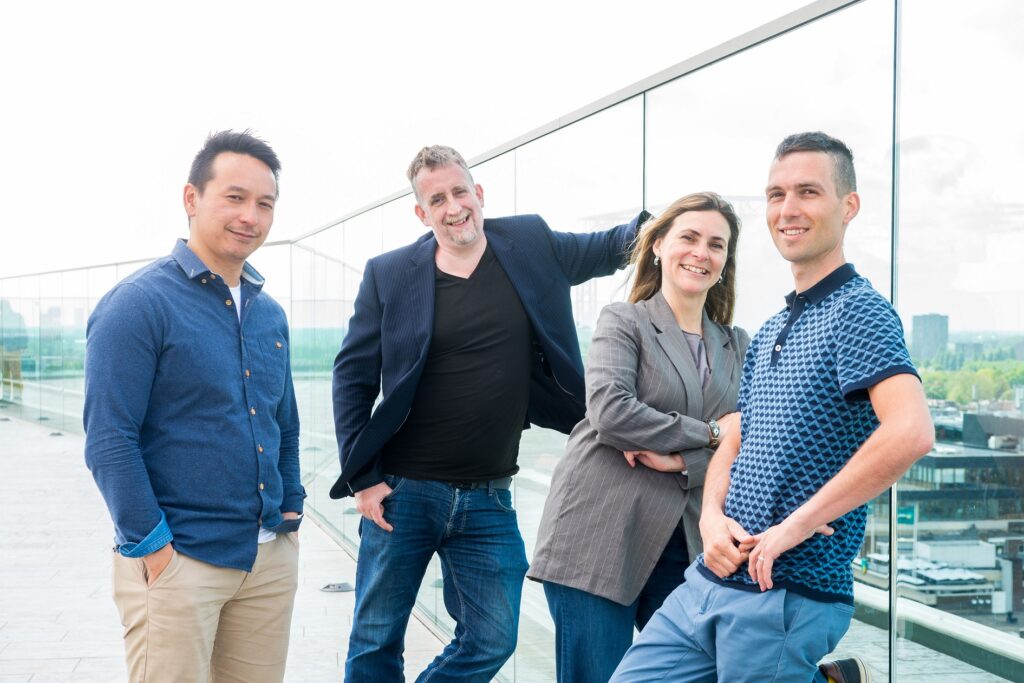
Navigator
Lung cancer often develops because of deviations or mutations in important proteins. During the course of the illness new mutations develop, causing the chosen treatment to lose its effectiveness. The software of Protyon creates a 3D model of the mutated protein based on the genetic code of the mutation, allowing clinicians to analyse much better which treatment will be effective. The name of the company contains the essence of the startup: a contraction of ‘Procyon’ and protein. Rositsa Jordanova, CEO at Protyon: “Procyon is the name of a very bright star, that used to function as a navigation point for sailors. The combinations sums up our mission well: to be a navigator for clinicians who fight protein driven diseases.”
Game changers
CEO Rositsa Jordanova stresses the important role of clinicians and researchers at the UG and the UMCG: “With the development of this software, we build on the very important pioneering work of the UMCG, especially the MTB Groningen. The MTB Groningen is the platform for the implementation of a personalised treatment plan for rare and complicated molecular changes in cancer patients. The UMCG is to date the only hospital that uses molecular modelling: they have been true game changers in the treatment of lung cancer.”
National and international interest
The first research and pilot studies show good results for patients, that exactly match the mission of Protyon: better quality of life and where possible the prolongation of life, sometimes up to 18 months. The results of the MTB and of Protyon do not go unnoticed in the medical world, says Groves: “We notice a keen interest from other Dutch and international hospitals for this technique.” Daan van Oldeniel, business developer at ODE: “The aim of ODE is to make the Northern Netherlands a worldwide expert in the development of innovative diagnostics. This national and international interest shows how well this project Protyon fits within our ecosystem.”
About Protyon
The healthtech start-up Protyon has been established in 2022 as a spin-out of the University of Groningen and the UMCG Innovation Center. This entity within the UMCG helps health professionals and researchers in and outside the UMCG to turn their innovation into a success. Protyon develops software that allows clinicians to establish personalised treatment for lung cancer patients based on the molecular modelling of mutations in lung cancer. The origin of the company lies in the year in 2016. In this year the collaboration between prof. dr. Matthew Groves, professor in the molecular biology at the UG and Josef Melcr, researcher at the UG in the field of biophysics, chemistry and biology, takes off with precursors of the molecular modelling by hand. The goal of Protyon is to develop an algorithm that allows molecular modelling tools swiftly, cost effective and automatically for all types of cancer in favour of effective treatments. More information: www.protyon.tech
Reyedar (prev. Reperio Medtech) Secures € 3 Million Investment
Groningen, 5 July 2023 – Reyedar, a deeptech startup and ODE learning project developing a proprietary medical technology platform for early detection of age-related degenerative diseases, announced today that it secured a € 3 million investment to further advance its ground-breaking solution. Eye tracking technology combined with deep learning provides a unique window to the brain and to people’s health situations in which many age-related diseases can be detected. The funding round is led by Cottonwood Technology Fund, a leading venture capital firm that invests in early-stage technology companies. The round was joined by NOM, Pupil Labs, Uneti Ventures, and existing investor Blue Sparrows MedTech Fund.
As the aging population grows rapidly, the number of people with degenerative diseases such as Glaucoma, Parkinson’s, and Multiple Sclerosis increases. Screening methods for these diseases are often invasive, unreliable, and time-consuming, leading to pressure on the healthcare system. Reyedar’s technology solves this problem by detecting early symptoms within minutes in a non-invasive way. Combining deep learning with eye tracking sensors on a user-friendly device, the company improves treatment outcomes and decreases healthcare costs.
Reyedar, previously known as Reperio Medtech, is a spin-off company of the Ophthalmology Department of the University Medical Center Groningen in the Netherlands.
“This investment is a huge opportunity to accelerate the development and commercialization of our technology. Everyone in our team is really thankful and thrilled,” said Dr. Alessandro Grillini, Founder & CEO of Reyedar. “With this funding, we will grow our team, launch our first product in the eye care market, expand our product offering, and ultimately improve the lives of millions of people affected by age-related degenerative diseases.”
“It is very exciting to lead this investment in Reyedar and support the development of this ground-breaking technology,” said Patrick Claessen, Partner of Cottonwood Technology Fund. “Reyedar has an experienced team and developed an impressive technology platform that translates eye movement to actionable medical insights. The company has the potential to make a huge positive impact on human lives by healthier aging for millions of people. “
“We are delighted to participate in this funding round for Reyedar,” said Annemieke Wouterse, Senior Investment Manager at NOM. “The company’s innovative technology offers early detection of multiple degenerative diseases using the eyes as a window into one’s health. This technology significantly reduces waiting lists in the health sector, and we look forward to working with the team to bring their technology to market.”
Source article: Reyedar
Dynamics of diagnostics evident during Open Diagnostics event
14 June 2023
The field of medical diagnostics is developing rapidly in the Northern Netherlands, as became visible during the Open Diagnostics event on Tuesday 13 June at the UMCG. About 40 participants gathered during this event organized by the Open Diagnostics Ecosystem (ODE). The aim of the event was to bring together the companies and organizations working in diagnostics and to inform each other about the latest developments and projects in this field. Peter Ketelaar, director of ODE: “Developments in the field of diagnostics are moving very fast, especially here in the Northern Netherlands. From the ODE, we are stimulating those developments, and with this event we want to spotlight the new projects and collaborations. We really believe in the power of knowledge sharing and short lines of communication, which takes us all further.”
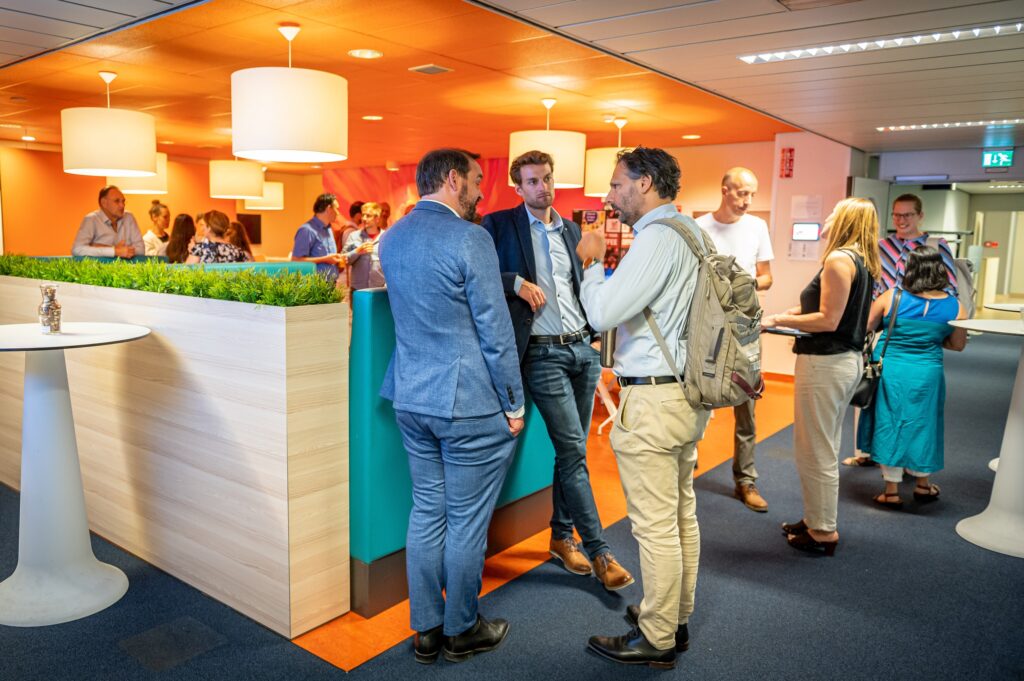
Showcases
After the event opening by Peter Ketelaar, Monique Koolman, board member of the foundation ‘Vrienden Beatrix Kinderziekenhuis’, welcomed the participants to the UMCG. An interesting showcase of innovative diagnostics was also put in the spotlight. Clinical chemist Dr. Anneke Muller Kobold (UMCG) presented her research and project into home monitoring of children with inflammatory bowel disease (IBD).
More resources for diagnostics
Three ODE learning projects gave the participants a glimpse into the progress of their individual learning projects: Protyon, Neolook and Sabiad. In addition to the projects and plans, ODE itself presented some great news during the event. The organization has been given extra time and resources to set up and supervise additional new learning projects until the end of 2023. “It is very good news that we have been given extra time and money to stimulate new projects in the field of diagnostics. We therefore warmly invite researchers and entrepreneurs with good plans to contact us,” said Elke Veenman, Project Leader Open Diagnostics Ecosystem.
Open Diagnostics Ecosystem strengthening ties with the United Kingdom
24-04-2023
Last week, a delegation of eight British companies from the MedTech & Diagnostics sectors visited Campus Groningen, where they were introduced to the LIFE Cooperative, to innovate, engage with likeminded business and research partners in the Open Diagnostics Ecosystem to share best practice and explore possible cooperation opportunities.
In late-2022, the UK embassy in the Hague established contact with ODE, and after a 6-month period of close collaboration with the UK embassy in The Hague and Innovate UK, we welcomed the UK delegates on April 19th, in the Innovation Center Chemistry and Engineering.
The day itself was comprised of interactive and dynamic meetings. After a brief introduction to our LIFE Sciences Ecosystem, by director Peter Ketelaar, Elke Veenman elaborated how the pharmaceutical and diagnostic value chain in the north is being organized. Following their presentations, IQ Corporation Joost Schuitemaker led an interesting and interactive discussion about changes in and subsequent challenges of the regulatory environment of the EU. It became clear that British and Dutch companies are expected to continue to face challenges getting new and current diagnostic technologies to the EU market to improve patient care. Elmar de Jong elaborated about the opportunity for innovative foreign businesses to acquire a permit for a one-year stay in the Netherlands with the Startup Visa program.
Both the British and Dutch MedTech and Diagnostics industries are essential players in addressing the pressing health challenges of our times. On the day of the visit, leading innovators from both nations have come together, creating the potential to generate significant value for companies operating in the MedTech & Diagnostics and contribute to the global advancement in the broad areas that the two sectors cover. The Open Diagnostics Ecosystem is actively contributing to the development of new innovative diagnostic technologies via co-creation and collaboration in the Northern part of the Netherlands.
We thank our partners Paramedir, Asc Academics, IQ Corporation, Demcon, Ardena, Biomarker Bay, Reperio Medtech, Protyon, Symeres, Nostics, CC Diagnostics and SG Papertronics sharing their experiences and active contributions during this day.
Aston Vision Sciences Ltd, CardioCrown, Enhanced Fertility Programme, HAUGHTON DESIGN LIMITED, Laennec AI Limited, Mindtech Global Limited, Proteotype Diagnostics, and Rapidx Bio thank you for coming over. It was great to have you in Groningen.
The visit was part of the Global Business Innovation Programme run by Innovate UK and Innovate UK EDGE and supported by the UK Science and Innovation Network and the British embassy in The Hague.
The Open Diagnostics Ecosystem is supported by the SNN, EFRO and the municipality of Groningen.
Extra ogen en oren op afstand
Neolook ontwikkelt met ODE slim digitaal sensorsysteem voor vroeggeborenen en kwetsbare kinderen op de intensive care
30-3-2023
De zorg voor vroeggeboren en kwetsbare kinderen in ziekenhuizen is zeer intensief. Een extra paar ogen en oren op afstand helpt ouders, verpleegkundigen en artsen om optimale zorg te kunnen geven. Het bedrijf Neolook ontwikkelt hiervoor digitale diensten, een sterk camerasysteem met extra sensoren voor beweging, geluid en licht. Deze ‘Neolook One’ maakt live consultatie op afstand mogelijk en geeft livestreams na alarmsignalen door op monitors en zorgtelefoons. Zo houden artsen en verpleegkundigen zicht op de kwetsbare patiënten waar ze ook zijn. Ook stelt deze technologie ouders in staat verbonden te zijn met hun kindje, als zij niet naast de couveuse of het bed zitten. Voor de doorontwikkeling van dit systeem heeft Neolook succesvol een aanvraag gedaan bij het Open Diagnostics Ecosytem (ODE). In dit leerproject, dat loopt van 1 maart tot 30 juni 2023, werkt Neolook samen met het UMCG en de noordelijke bedrijven Pezy en de Telecom Service Groep. Elke Veenman, projectleider Life Science en Health bij ODE, is blij met de start van dit nieuwe leerproject: “De focus van dit project sluit uitstekend aan bij het doel van ODE, namelijk om Noord-Nederland wereldwijde expert te maken in het ontwikkelen van innovatieve diagnostica. De slimme digitale videocamera’s van Neolook zullen zorgverleners helpen ook in de toekomst medische diagnoses te stellen en optimale zorg te blijven leveren, ook als er minder handen aan het bed beschikbaar zijn.
Technologie als ondersteuning
De video augmented services die het bedrijf Neolook ontwikkelt, wordt gebruikt op de intensive care voor neonatologie (prematuren) en de intensive care voor pediatrie (kinderen in de leeftijd van drie maanden tot 18 jaar). “Het gaat erom dat dit werkt voor de mensen rondom de kwetsbare patiëntjes: de ouders, verpleegkundigen en artsen,” zo benadrukt Marco D’Agata, directeur van Neolook. “Enerzijds is het arbeidsondersteunende technologie om de juiste zorg te leveren. Maar het moet vooral een tool zijn in de handen van de zorgverlener om in te zetten zoals zij dat willen, dat is de kunst. Er waren wel camerasystemen op de markt, maar die bleken helemaal niet opgewassen tegen de eisen van zorgprofessionals. Hoog tijd dus om een fit-for-purpose oplossing te maken, waar de medici jaren mee vooruit kunnen.”
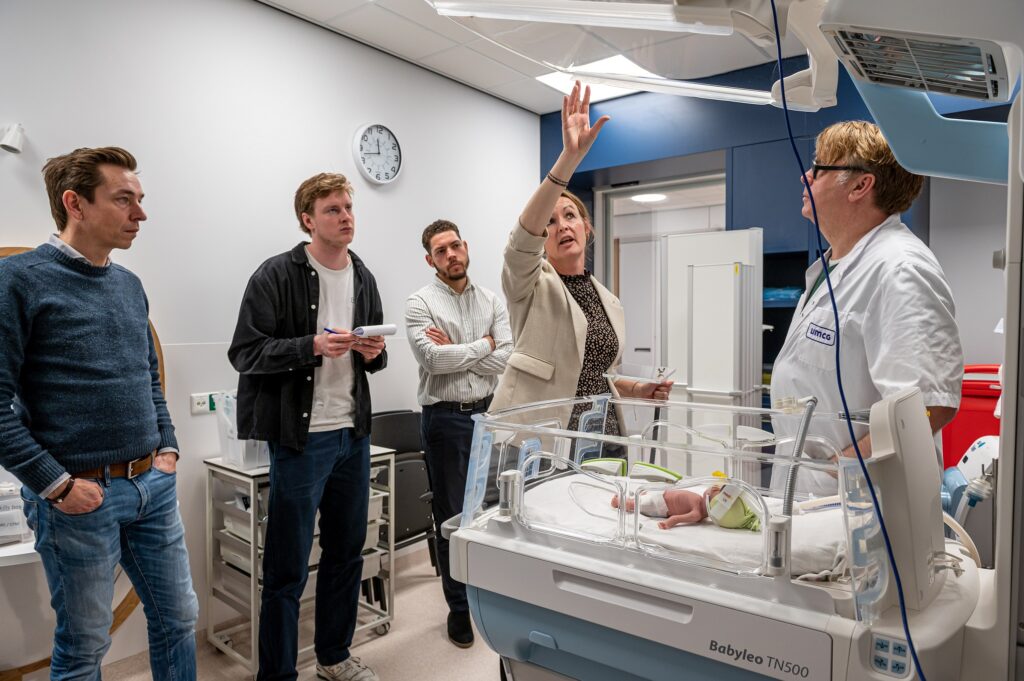
Werkbezoek van Neolook aan het UMCG op 29 maart 2023. V.l.n.r.: Sandor Schrijner (Business Development Manager, Neolook), Daan Noordman (Industrial Designer, Pezy Group), Miguel Boekhold (Solution Architect, Neolook), Annet Feenstra (Hoofd Verpleegkundige Neonatologie, UMCG) en Henk ter Horst (Kinderarts-intensivist Neonatologie, UMCG). Fotograaf: Geert Job Sevink
Samenwerking
De eerste samenwerking met het UMCG dateert al uit 2019. Marco D’Agata: “We hebben in het UMCG een zeer goede samenwerkingspartner. Zij zijn immers de ideale gebruiker, klant en deskundige op het toepassingsgebied.” In dit leerproject is Neolook de partij die de innovatieve oplossing bedenkt, ontwerpt en vermarkt voor deze specifieke niche. Maar Neolook heeft geen hoogwaardige kunde op het gebied van hardware en design. Via ODE is Neolook in contact gekomen met twee noordelijke bedrijven die hen op dit vlak aanvullen. Het bedrijf Pezy, ingenieursbureau en productontwikkelaar in Groningen, ontwikkelt het conceptdesign van de Neolook One. De Telecom Service Groep uit Leek is technisch specialist op het gebied van de sensoren, ook qua installatie en onderhoud. D’Agata ziet de voordelen van het ecosysteem van ODE: “Via ODE kwamen we bij de juiste lokale partijen Pezy en de Telecom Services Groep terecht, die relevante kennis en kunde inbrengen. Op deze manier gaat de ontwikkeling van onze dienst sneller en bovendien hebben we de partijen dicht bij elkaar die samen kunnen leveren: van design en productie tot installatie en beheer.”
Over Neolook
De start-up Neolook begon in 2020 als spin-out van Philips. Het bedrijf is gespecialiseerd in intensive care voor kwetsbare pasgeborenen en kinderen. Met behulp van zogenaamde video augmented services, het toepassen van slimme digitale video met data, software, algoritmes en kunstmatige intelligentie ontwikkelt Neolook praktische toepassingen voor het zorgteam van professionals, ouders en familie. Het bedrijf ondersteunt ziekenhuizen die vooruitstrevende zorgconcepten hanteren zoals Family Centered Care, Family Integrated Care of Neurodevelopmental care. Neolook werkt op landelijk niveau samen met ziekenhuizen, zorgverzekeraars en de Nederlandse AI-coalitie om de zorg voor de kleinste burgers te verbeteren. Meer info: www.neolooksolutions.com
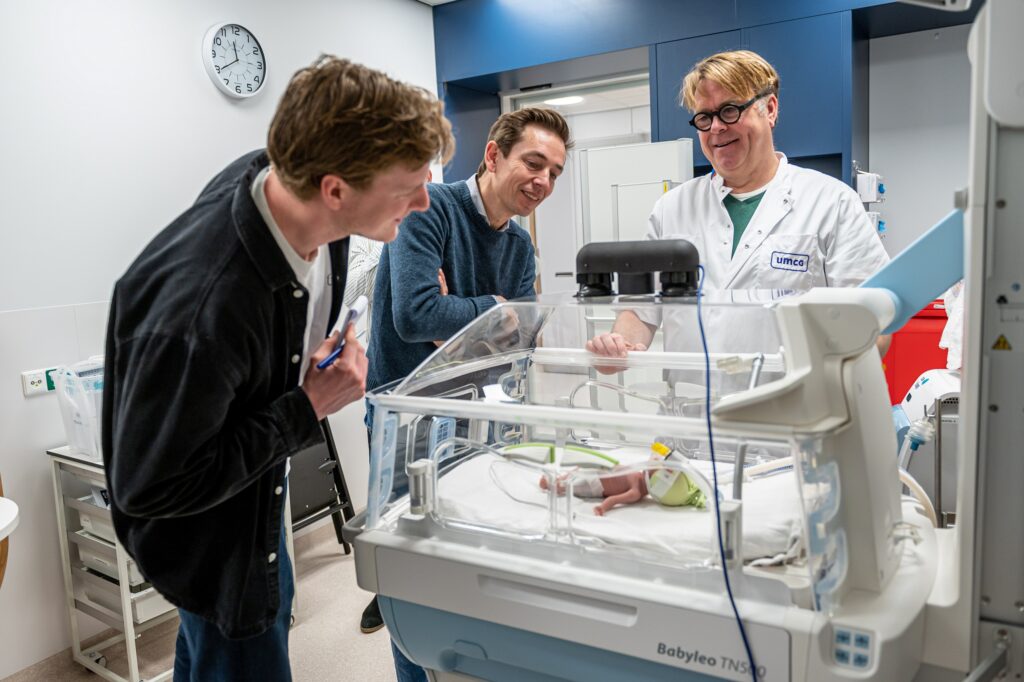
Impressive developments for projects in Open Diagnostics Ecosystem
9-2-2023
The Open Diagnostics Ecosystem (ODE) started in the beginning of 2021 to give start-up companies access to funding, knowledge, a strong network, and research & development facilities within the Northern diagnostics ecosystem. Peter Ketelaar, Director Open Diagnostics is proud of the achievements since the start of ODE: ‘’In the last year four startups were supported with their growth ambitions and in 2023 there are four more to come. Cooperation between the startups and more established companies is something that impressed me the most. An example is the way they represented the Open Diagnostics Ecosystem together during the LIFE Sciences Conference last September.” In this article ODE would like to share the developments from some projects in 2022. Open Diagnostics is an initiative from the LIFE Cooperative.
Collaboration is key
Detact Diagnostics, the first start-up that started within the Open Diagnostics Ecosystem, had a year with lots of innovative projects and achievements. One of the highlights was connecting with various dialysis centers for the collection of peritoneal dialysis waste fluid for the development of RenoTact. On top of that was the SynoTact project, the rapid test for diagnosing periprosthetic joint infections used at the UMCG in a pilot study in collaboration with the department of orthopedic surgery. ’Hedi Koning, COO of Detact Diagnostics, is very happy with the achievements over the last year. Key aspect in these achievements is collaboration: ‘We finished the first study investigating clinical samples for the SynoTact project together with the UMCG. This collaboration was initiated through to the Open Diagnostics Ecosystem. Besides, collaboration with the other start-ups was very valuable for performing our first internal audit.’’ In 2023, Detact Diagnostics is preparing for their Stage 2 audit for ISO13485 certification and expanding their clinical studies for both RenoTact and SynoTact
Successful pilot studies
Reperio, a start-up that is developing non-invasive, portable diagnostic tests using eye movements, had received positive results from pilot studies conducted at the UMCG in preparation for the clinical trials. They created a first fully functioning prototype of SONDA (Standardized Oculomotor Neuro-ophthalmic Disorders Assessment). And they also started generating revenue through R&D consultancy and received the Horizon 2020 ELISE grant, which is awarded to the 16 best start-ups in Europe that use AI for societal improvements.
Major step forward
Richard Rushby, CO-founder and COO at SG Papertronics is enthusiastic about their results in 2022: ‘’The pilot testing of our flagship product, the Beer-o-meter, among some of the best craft breweries in the industry, has been a major step forward for the company’’. The Beer-o-meter is a device that allows craft brewers to measure the quality and consistency of their beer in real-time, giving them the ability to make adjustments and improvements. The feedback from early adopters has been positive, complimenting the Beer-o-meter for its fast and accurate results, as well as its ease of use. With this positive start, SG Papertronics is excited to officially launch the Beer-o-meter in 2023 and to continue expanding its reach into other markets such as agriculture and point-of-care diagnostics.
Newest project
Tagworks, the newest project within Open Diagnostics works on developing a novel radio immunoimaging approach to improve tumor imaging techniques for breast cancer patients. The intended advantages of the technology include improved imaging quality and shorter exposure time to radiation for patients resulting in fewer side effects. Next to Tagworks the Open Diagnostics Ecosystem foresees four more projects in 2023.
Open Diagnostics Events
In 2023 Open Diagnostics is working on helping more start-ups and keeps focusing on sharing knowledge within the diagnostic field in the Northern Netherlands.
“Furthermore, the knowledge sharing from our ecosystem will also be conducted together with HTRIC during our joint Innovation Boosters. Stay tuned, because there is more excitement to come !’’ says Peter Ketelaar.
The final of Groningen OPEN has resulted in two matches for Open Diagnostics!
Last Thursday the final of Groningen OPEN took place in Plus Ultra Groningen on the Zernike Campus. Instead of one winner, Open Diagnostics chose two winners. “We were lucky enough to be able to choose from many applications. This worked out very positively for us because we chose not 1 but 2 winners,” said Elke Veenman, Open Diagnostics project leader during the final.
The winners are Protyon and Nostics. Both start-ups are developing in the medical diagnostics field and with a contribution of €1,500 from Groningen OPEN they can now develop an application for the Open Diagnostics Ecosystem. Congratulations on behalf of the Open Diagnostics team. We look forward to working together.
Groningen OPEN has matched three different established companies from the Northern Netherlands to start-ups. The matches help established companies to innovate and start-ups to find customers in the field. For the NNZ | the packaging network match, start-up [BEBR] has been chosen as the winner. Established company KroeseWevers has chosen LEF.
Open Diagnostics joins newest edition Groningen Open
The goal of Groningen OPEN is to link established companies to startups. With this they help established companies from the Northern Netherlands to innovate and prepare them for the future. On the other hand, they help startups find customers. By collecting targeted challenges from established companies, they can find the ideal match for the collaborations of the future.
Through Groningen OPEN Open Diagnostics is searching for startups with innovative ideas in medical diagnostics. The whole challenge is explained by Elke Veenman in the video underneath.
Pitches by possible new learning projects and ODE stakeholder meeting
The advisory board met to hear various pitches of possible new learning projects. The results of these pitches will be announced shortly. Immediately after the pitches, all stakeholders of Open Diagnostics met. The current learning projects presented their developments within the project, the Open Diagnostics team explained the current state of affairs and together they looked at the coming months. All in all a fruitful day.
LIFE Science Conference Aftermovie 2022
We proudly present the Life Science Conference Aftermovie! The Life Science Conference, organised by the LIFE Cooperative, took place in a packed Forum Groningen. Central were the collaborations within and with the LIFE Cooperative, of diagnostics, drug discovery to the clinic and medical technology. Next to keynote Speaker Ben Feringa, panel sessions and a walking lunch, the first LIFE Science Innovation Award was also awarded to the winner Detact Diagnostics.
The LIFE Science Conference and Innovation Award 2022 are made possible by NV NOM, gemeente Groningen, Bedrijvenvereniging WEST, provincie Groningen, Campus Groningen, Symeres, ICON, Open Diagnostics, Kadans Science Partner, Pharma Connect Capital, CantorClin, Lode Holding and the LIFE Cooperative. 📽 The aftermovie is created by: Ruben Walma
Open Diagnostics is exhibiting at #BIOEurope in Leipzig, Germany!
BIO-EUROPE is the gateway to the Global Biopharma Community and the north of the Netherlands is represented by the LifeCooperative, InnoCore Pharmaceuticals, Symeres, Ardena and Open Diagnostics. Come meet us at booth 22, October 24–26, 2022!
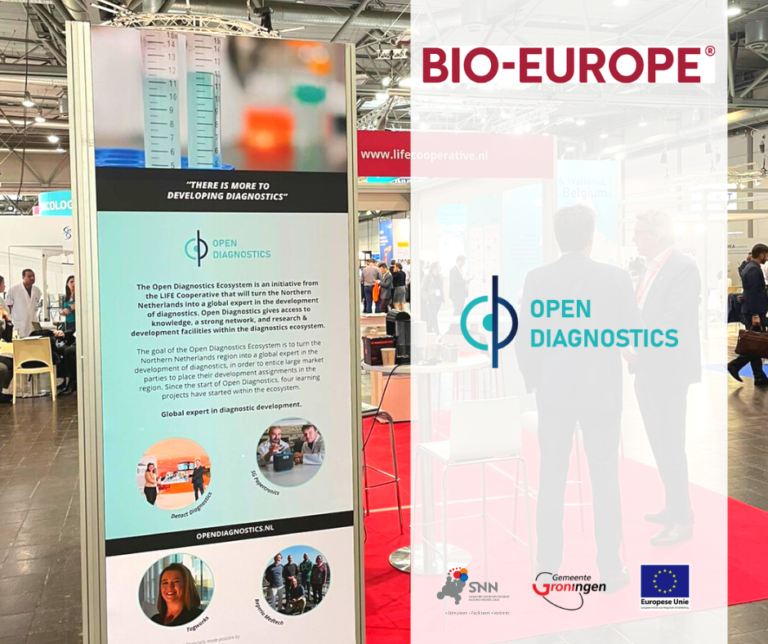
Brandstof voor diagnostiek
Start-ups in de medische diagnostiek die een zetje in de goede richting willen, kunnen aankloppen bij Open Diagnostics. Behalve een relevant netwerk krijgen ze ook financiële hulp.
Elke Veenman, projectleider bij ODE zegt hierover in de nieuwste editie van NoordZ: ,,Veel innovatie bleef op de plank liggen. Dat willen we nu voorkomen.”
Lees hier het hele artikel en interview met Elke Veenman en Ep Oosting!
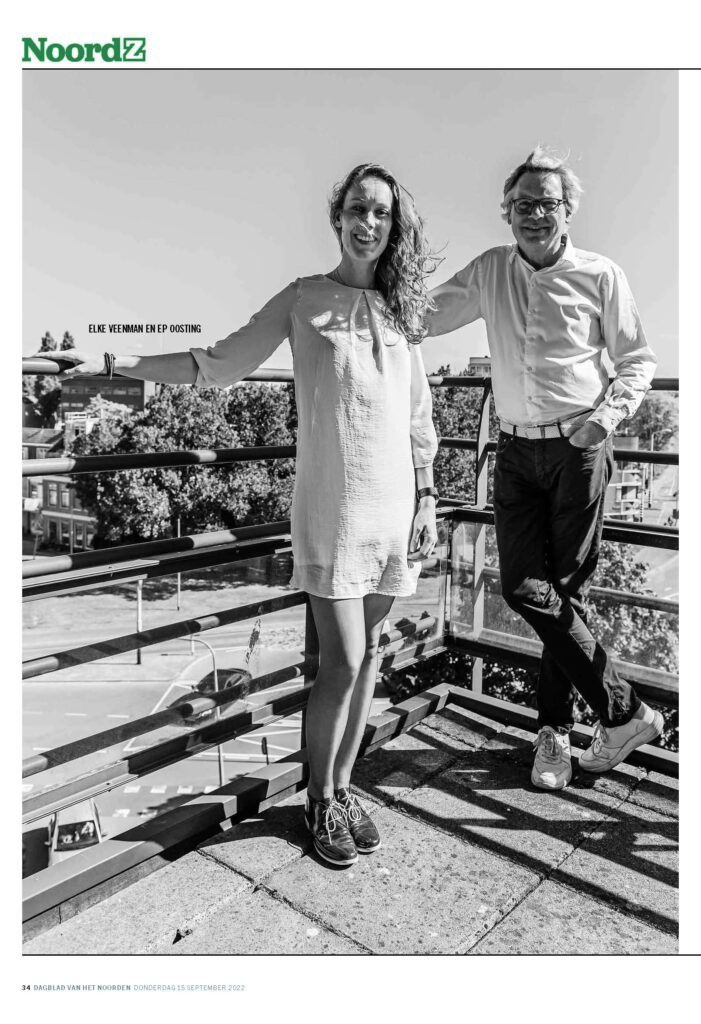
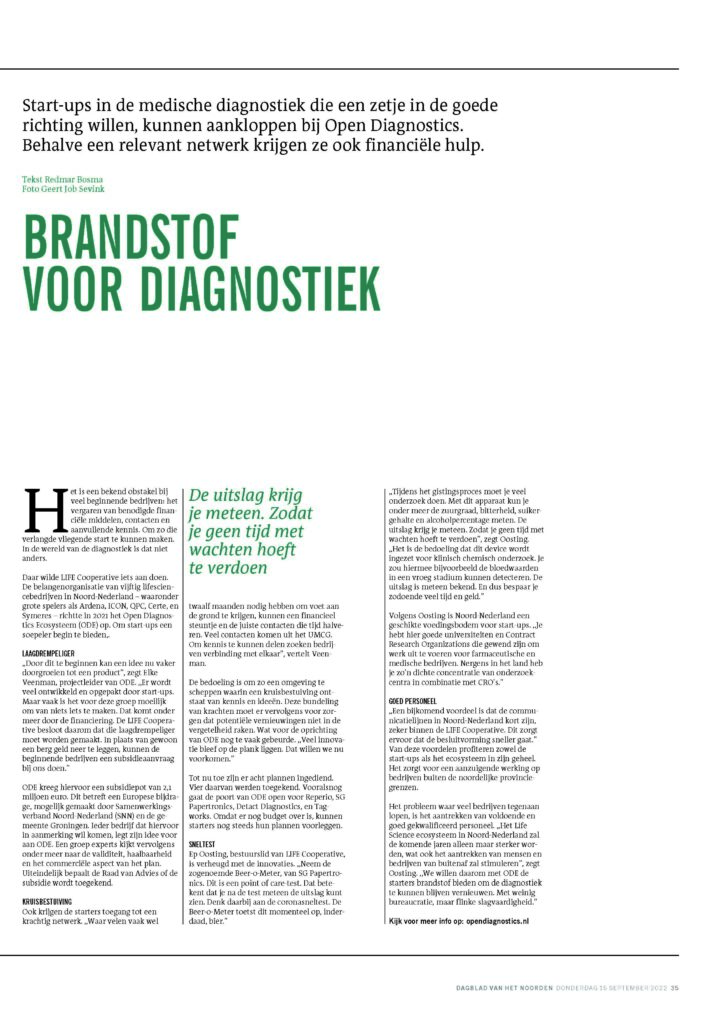
The Open Diagnostics ecosystem (ODE) proudly presents to you: the Open Diagnostics movie!
Since the start of Open Diagnostics, the ecosystem is growing and three projects have started. In this short movie Detact Diagnostics, Reperio Medtech and SG Papertronics B.V. display how they are developing their diagnostic tools. Find out more about the Open Diagnostics Ecosystem and our projects!
Ton Vries, director of Open Diagnostics: ‘’We are proud of the achievements already made within the ecosystem. Together we will turn the Northern Netherlands into a global expert in the development of diagnostics.”
Video by: Ruben Walma
First Open Diagnostics Event highlights novel diagnostics that arrive from Groningen
Diagnostics is more visible than ever, and it is all happening in Groningen and the Northern Netherlands. On May 10th, more than 40 people from the diagnostics ecosystem gathered in the Forum Groningen for the very first Open Diagnostics Ecosystem Event. Not only the strong network of the Northern provinces was present, but also key entrepreneurs and researchers from Leiden and Wijchen joined the event. The innovative and in 2020 launched Open Diagnostics Ecosystem (ODE) looks back at a successful event.
After an introduction from the director of ODE, Ton Vries, the afternoon started with Mike Martens, who is a member of the Advisory Board and working at Future Diagnostics. Martens related in his presentation to the many key trends that are fueling the global in-vitro diagnostics (IVD) and also that the existing diagnostic tools are minimalizing and making it easier to do rapid tests at the bedside of the patients.
“Nowadays it becomes easier to test nearby the patients, and I think that in the future it also will be the patient who has control over a lot of diagnostic tools. Look at what is already existing in your phone and smart watch. I think that Apple and Google will be the next diagnostic company”, Mike Martens explains.
Open Diagnostics facilitates the network
The Open Diagnostics Ecosystem is an initiative from the LIFE Cooperative that will turn the Northern Netherlands into a global expert in the development of diagnostics. Open Diagnostics gives access to knowledge, a strong network, and research & development facilities within the diagnostics ecosystem.
Reperio Medtech is one of the projects within ODE and is developing non-invasive, portable diagnostic tests using eye movements. Their current diagnostic tool for indicating whether someone has Glaucoma will be further developed within ODE for diabetic retinopathy. Alessandro Grillini, Managing Director (Reperio) added: “We are very happy to be part of ODE, because of the network and the access to bigger companies. We believe in the power of networks”
Next to Reperio, also Linic Ventures joined the stage to talk more about their current developments and innovations. Linic is currently developing a software application to support vascular diagnostics. The software is based on the principles of Machine Learning.
It happens in Groningen
Next to the previous speakers, Prof. Dr. Matthias Barz from the University of Leiden was invited to give insights into the therapeutic efficiency of targeted nanomedicines, and that their efficiency requires clinically applicable imaging tools. And also, Albert Wolthuis gave insights into new medical laboratory diagnostics. The crowd noticed that some chemistry structures used in the presentations where great, and that it was all created here in Groningen!
Open Diagnostics is made possible by


